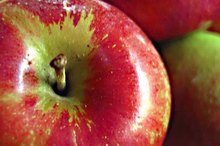Is Apple Cider Vinegar Bad for Tooth Enamel?
Natural health experts tout drinking apple cider vinegar as a remedy for a host of ailments: from using it as a digestive aid to soothing a sore throat to getting rid of dandruff and foot odor. The dental community, however, warns that apple cider vinegar can be bad for your tooth enamel due to its high acidity.
What Is Apple Cider Vinegar?
Apple cider vinegar is made from apple juice and fermented twice, becoming apple cider in the first round and then transforming into vinegar in the second. At that point, the substance becomes a mixture of probiotics, beneficial bacteria and enzymes, especially when left in its unfiltered and unpasteurized state, recognizable by a cloudy blob at the bottom referred to as “the mother.” One reason apple cider vinegar fans drink it is because the mother is full of beneficial enzymes, pectin and trace minerals, functional medicine practitioner Dr. Tina Discepola said in Mindbodygreen.
Apple cider vinegar is a popular folk remedy recommended for numerous internal and external uses. Proponents claim that it can aid in whitening your teeth, fight tooth decay, help heal chronic gum infections, support immune functions, assist in losing weight, regulate blood sugar and reduce risk of heart disease. It’s also used to clean external surfaces – for example, fruits and vegetables when combined with lemon juice – and is suggested as a tonic to help clear skin of acne and remove the buildup of products in your hair. There is not a lot of scientific research, however, to back up its effectiveness or confirm its safety.
- Apple cider vinegar is made from apple juice and fermented twice, becoming apple cider in the first round and then transforming into vinegar in the second.
- It’s also used to clean external surfaces – for example, fruits and vegetables when combined with lemon juice – and is suggested as a tonic to help clear skin of acne and remove the buildup of products in your hair.
Risks Associated with its Use
How to Clean a Toothbrush
Learn More
Although apple cider vinegar has been touted as a miracle cure, when it comes to your tooth enamel, the acetic acid in the vinegar is terrible for it; rinsing with water might not prevent damage to the enamel. The vinegar has a pH level of 3.075, a level that makes it more harmful than coffee, but less harmful than lemon juice. Tooth enamel begins dissolving at a pH level of around 5.5, depending on the individual.
Because tooth enamel is left in a weakened state after coming into contact with apple cider vinegar, it can be worsened if you brush your teeth right after sipping it or gargling it in your mouth. Instead, wait half an hour after consuming something acidic before brushing to avoid removing enamel when it’s in a tender state.
- Although apple cider vinegar has been touted as a miracle cure, when it comes to your tooth enamel, the acetic acid in the vinegar is terrible for it; rinsing with water might not prevent damage to the enamel.
- Because tooth enamel is left in a weakened state after coming into contact with apple cider vinegar, it can be worsened if you brush your teeth right after sipping it or gargling it in your mouth.
How to Use Apple Cider Vinegar
If you’re going to ingest apple cider vinegar, there are a few things you can do to mitigate the risk to your enamel: One way is to water it down before drinking it, placing one teaspoon of apple cider vinegar in 8 ounces of water. Another recommendation is to sip it with a straw, minimizing the acid’s contact with your teeth. You can also mix it with olive oil to create a salad dressing and eat it with other food types to balance the pH levels.
Related Articles
References
- 20 Mistakes You’re Making With Your Teeth
- Really? Never Brush Your Teeth Immediately After a Meal
- 11 Ways To Use Apple Cider Vinegar Every Day
- Journal of the Canadian Dental Association, Dec 2003: What Is the Critical pH and Why Does a Tooth Dissolve in Acid?
- Shishehbor F, Mansoori A, Shirani F. Vinegar consumption can attenuate postprandial glucose and insulin responses; a systematic review and meta-analysis of clinical trials. Diabetes Res Clin Pract. 2017;127:1-9. doi:10.1016/j.diabres.2017.01.021
- Kondo T, Kishi M, Fushimi T, Ugajin S, Kaga T. Vinegar intake reduces body weight, body fat mass, and serum triglyceride levels in obese Japanese subjects. Biosci Biotechnol Biochem. 2009;73(8):1837-43. doi:10.1271/bbb.90231
- Mohammad P, Mojtaba H, Mohammad N. Successful treatment of chronic scalp seborrheic dermatitis using traditional Persian medicine: a case report and literature review. Galen Med J. 2017;6:157-9. doi:10.22086/GMJ.V6I2.706
- Yagnik D, Serafin V, J Shah A. Antimicrobial activity of apple cider vinegar against Escherichia coli, Staphylococcus aureus and Candida albicans; downregulating cytokine and microbial protein expression. Sci Rep. 2018;8(1):1732. doi:10.1038/s41598-017-18618-x
- Atik D, Atik C, Karatepe C. The effect of external apple vinegar application on varicosity symptoms, pain, and social appearance anxiety: a randomized controlled trial. Evid Based Complement Alternat Med. 2016;2016:6473678. doi:10.1155/2016/6473678
- Chang J, Han SE, Paik SS, Kim YJ. Corrosive esophageal injury due to a commercial vinegar beverage in an adolescent. Clin Endosc. 2019 Aug;2019:ce.2019.066. doi:10.5946/ce.2019.066
- Biswal B. Drug-excipient interaction study for apple cider vinegar with 20 potential excipients using modern analytical techniques. Asian J Pharma. 2016;2016:107. doi:10.22377/ajp.v10i1.530
Writer Bio
Raquel Villarreal honed her editorial skills in bilingual and bicultural environments, launching and nurturing web properties such as eHow en Español and Livestrong.com en Español. Prior to that, she gained editorial experience at print magazines such as Time Out New York and Texas Monthly, among others.









